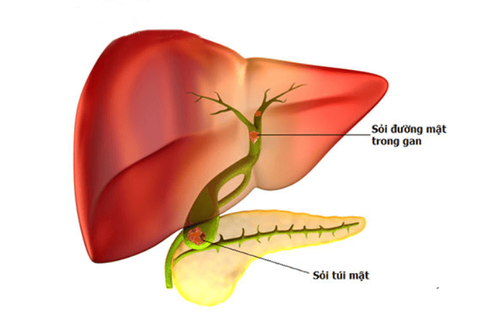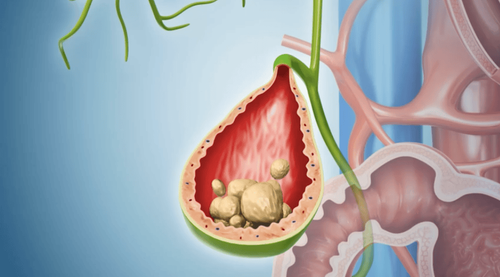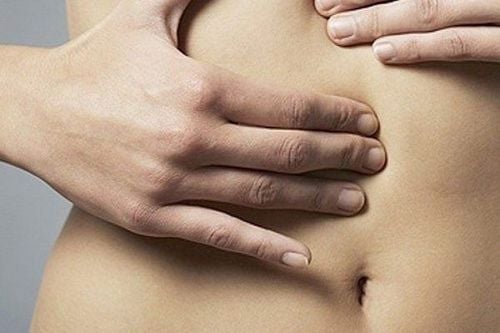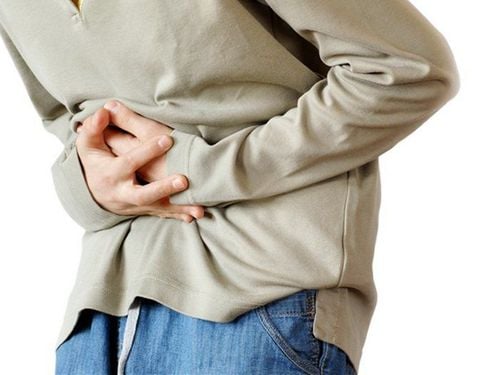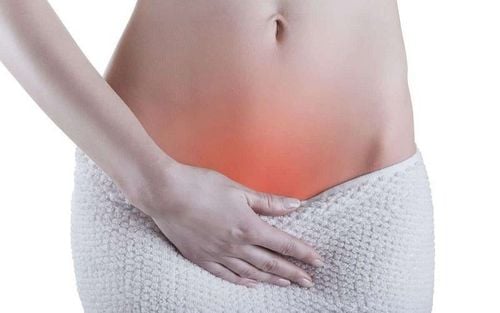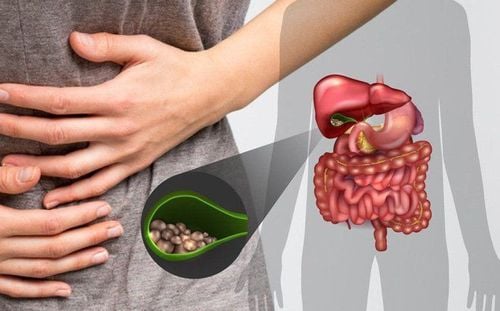The article was professionally consulted by a Gastroenterologist - Department of Examination & Internal Medicine - Vinmec Da Nang International General Hospital.
Changes during pregnancy can affect the functioning of the gallbladder, causing gallstones or sludge. Although not all pregnant women have gallstones, if they do, they can cause symptoms and complications such as gallbladder colic, cholecystitis, cholangitis and acute pancreatitis due to stones affecting the baby in the womb.
1. How are gallstones formed?
The gallbladder is a small organ shaped like a pear, located just below the liver. The gallbladder stores excess bile that the liver produces to digest fats. When we eat a fatty meal, the gallbladder releases bile into the small intestine. However, this process sometimes does not happen so smoothly.
If there is not enough bile salts, too much cholesterol or the gallbladder does not function effectively, hard stones called gallstones will form. Gallstones in the gallbladder not only prevent bile from escaping but also cause cholecystitis, causing severe pain and is a medical emergency. When the gallbladder does not function effectively and causes many problems, the doctor can remove it, the body will learn to gradually adapt to the changes in the digestive system.
2. How does pregnancy affect the gallbladder?
Women are less likely to have gallstones than men, but pregnant women are at particular risk, with an incidence rate of 0.05-0.33%, especially the elderly, obese and those with a family history because at this stage gallbladder motility decreases and cholesterol saturation increases, causing the gallbladder to deposit and form stones.
Gallstones are a fairly common disease during pregnancy because the hormones estrogen and progesterone produced during pregnancy make the muscle tissues in the body more relaxed, causing the bile secretion process to slow down and easily form gallstones as well as cause complications. Pregnant women with gallstones may also experience the following symptoms, appearing about 1-3 hours after eating a fatty meal:
- Pain in the epigastric region or the upper right 1/4 of the abdomen, pain at the gallbladder location. The pain can be dull or sharp, severe pain. The pain may gradually decrease after 1 hour or last for several hours.
- If the pain worsens, lasts >4-6 hours, spreads to the shoulder or back, fever, fatigue, nausea and vomiting may suggest complications.
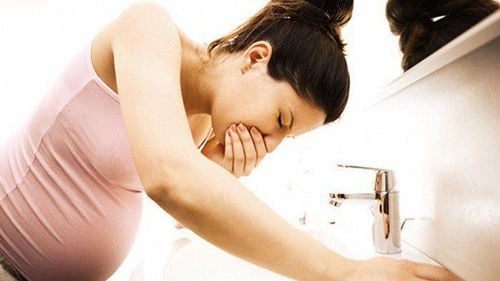
3. When should pregnant women with gallstones go to the hospital?
Some pregnant women may have gallstones without any symptoms. This disease is also known as "silent gallstones". Normally, this condition will not affect gallbladder function, but when gallstones move or cause complications, it can cause gallbladder pain.
Sometimes the symptoms will disappear within 1 - 2 hours, sometimes they can last, making pregnant women extremely worried. If pregnant women have the following symptoms and do not disappear within 1 - 2 hours, they need to go to the hospital immediately:
- Chills and/or mild fever;
- Nausea and vomiting;
- Abdominal pain lasting more than 5 hours.
- Dark urine;
- Jaundice;
- Light-colored stools
These are all signs that gallstones are starting to cause inflammation and infection.
4. Treatment for pregnant women with gallstones during pregnancy
If a pregnant woman has gallstones without any serious or uncomfortable symptoms, the doctor will prescribe medical treatment with medication to reduce symptoms or no treatment is needed during pregnancy. Gallstones usually do not have any adverse effects on the fetus and the development of the fetus does not cause the gallstones to grow larger. However, if gallstones prevent the gallbladder from expelling bile or cause prolonged pain, affect weight, or have complications, surgery may be required.
Undergoing surgery while pregnant is not an ideal treatment method, but it is completely possible to safely remove the gallbladder. Gallstones can be removed by endoscopic retrograde cholangiopancreatography (ERCP). The doctor will use a flexible endoscope from the mouth to the duodenum and into the common bile duct, the stones will be removed through this tube, the pregnant woman's abdomen will be covered so that the fetus is not affected.
Another method is to remove the gallbladder through laparoscopic or open surgery, performed in the second or third trimester of pregnancy. Gallbladder removal surgery is the second most common surgery during pregnancy and the most common surgery is appendectomy.
5. Reduce the risk of gallbladder complications during pregnancy
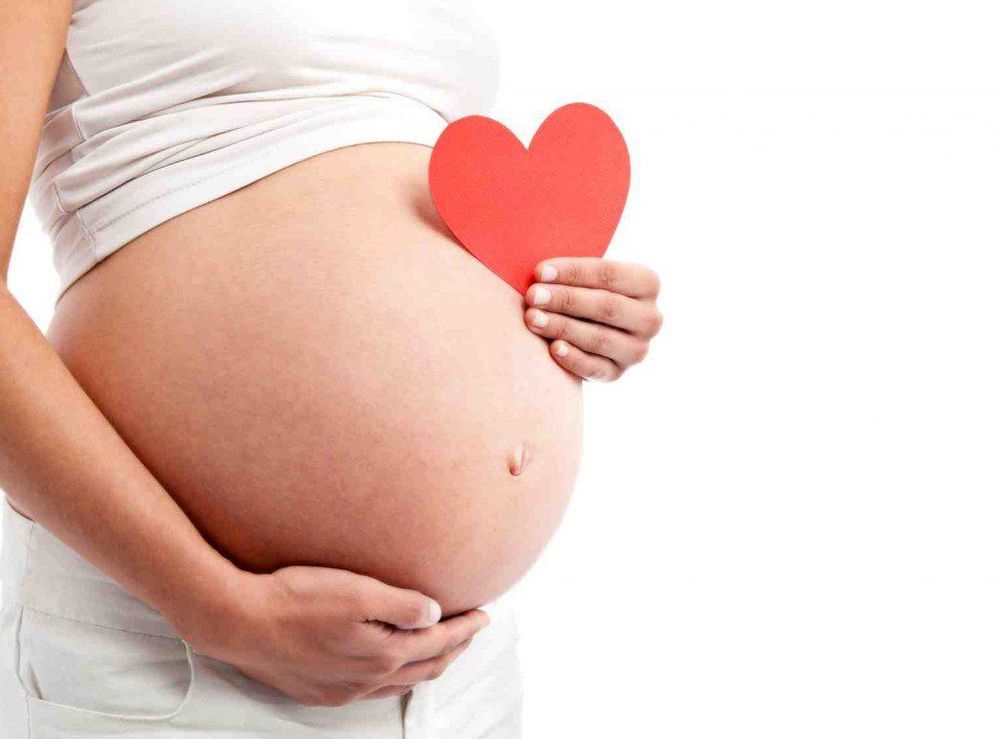
There is no way to reduce the risk of gallbladder-related complications. Cholestasis or gallstones during pregnancy are often related to pregnancy hormone changes in women with certain genes, but they are not common. Because the cause is related to genes, about 90% of women who have had one will have this condition again in the next pregnancy.
Building a healthy, low-fat, high-fiber diet during pregnancy can reduce the risk of serious gallstone complications and help both mother and baby stay healthy.
6. Should you get pregnant if you have gallstones?
Women with gallstones who intend to get pregnant should consult a hepatobiliary specialist about their current medical condition and ask for advice about pregnancy. Theoretically, it is best to have stable medical treatment before getting pregnant. Because when pregnant with a medical condition that requires emergency surgery to save the mother, surgery must still be performed, which may affect the fetus, depending on the severity of the disease, the tolerance of the mother and baby, the gestational age at the time of surgery, etc.
To arrange an appointment, please call HOTLINE or make your reservation directly HERE. You may also download the MyVinmec app to schedule appointments faster and manage your reservations more conveniently.





